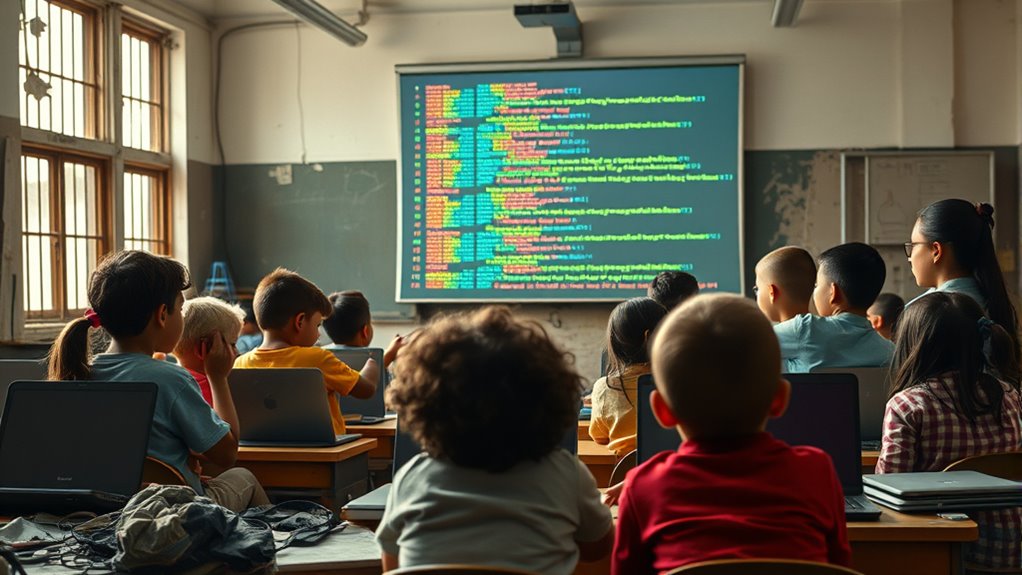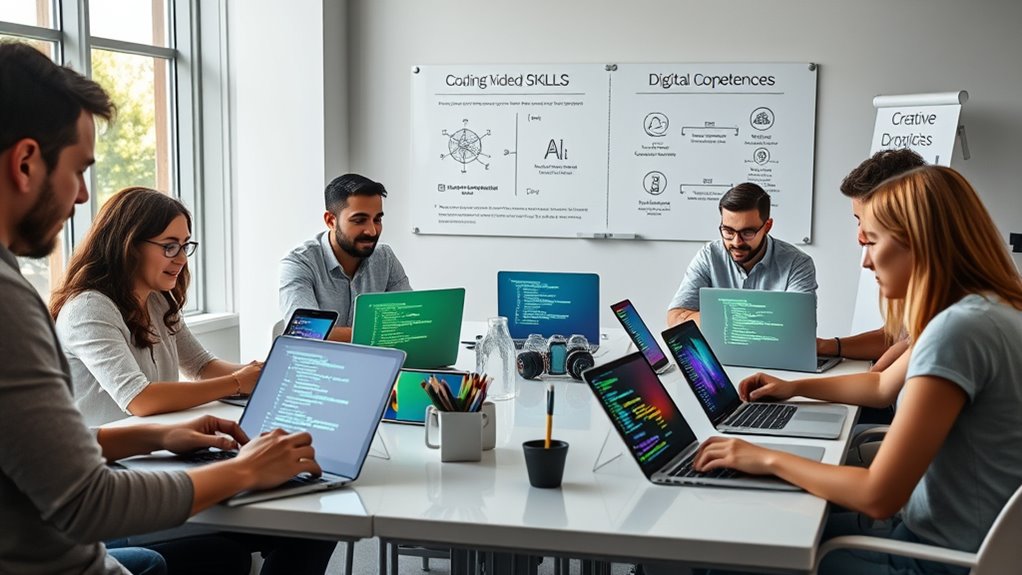In today’s AI-driven world, learning to code can boost your job prospects, automation skills, and digital literacy. While AI automates much of the coding process, understanding programming helps you work alongside these tools and stay adaptable. Coding skills open doors to high-paying careers, especially in growing fields like AI, data, and cybersecurity. If you keep exploring, you’ll discover how to navigate and succeed in this ever-changing digital landscape.
Key Takeaways
- Coding skills are increasingly vital for automation, innovation, and high-paying roles across diverse industries.
- AI automates many coding tasks, but understanding the fundamentals remains essential for oversight and customization.
- Digital literacy and coding proficiency enhance adaptability in a rapidly evolving job market driven by AI.
- Equitable access and inclusive education are crucial for broader participation in the digital economy.
- Continuous learning and blending coding with other digital skills ensure resilience and future relevance.
The Growing Importance of Coding Skills in a Digital World

As digital technology continues to shape our world, coding skills have become more essential than ever. Nearly 92% of jobs now require digital skills, making coding a critical part of the modern workforce. It’s no longer limited to tech roles; industries like marketing and finance rely heavily on coding for automation and data analysis. Higher digital content in jobs correlates with increased wages, highlighting its economic value. Coding enables you to automate tasks, boost efficiency, and drive innovation. It also sharpens problem-solving and critical thinking, giving you a competitive edge. As digital tools become integral to all sectors, mastering coding opens doors to high-paying careers and helps you stay adaptable in a rapidly evolving job market. Developing coding literacy is now considered a fundamental skill for future success. Coding truly is becoming as fundamental as literacy.
Current Access and Disparities in Coding Education

The push to integrate coding into school curricula has made programming more accessible for many students, especially through visual tools like Scratch and Blockly. These platforms help you grasp fundamental concepts and develop critical thinking skills early on. Outside the classroom, coding camps and extracurricular programs deepen understanding and skill levels. However, access isn’t equal everywhere. Geographic disparities mean some regions lack resources or infrastructure, limiting opportunities for students like you. Socioeconomic factors also play a role—those with more resources often have better facilities and instructors. The digital divide remains a barrier for many, especially in areas with limited internet. Limited funding and staffing challenges further hinder widespread access. According to recent surveys, while progress is happening, disparities still restrict many from fully benefiting from coding education. Additionally, the lack of business-oriented programs can limit students’ exposure to practical applications of coding skills in real-world scenarios. Moreover, fostering creative practice within coding education can inspire innovative problem-solving and adaptability, but such opportunities are not uniformly available. Recognizing the importance of digital literacy is crucial for preparing students to thrive in an increasingly technology-driven world. Furthermore, integrating diverse confectionery techniques can stimulate creativity and innovation among learners. Emphasizing interactive learning environments can also enhance engagement and retention in coding education.
How AI Is Transforming the Coding Landscape

AI is reshaping how you develop software by automating repetitive tasks and boosting productivity. It helps guarantee code consistency and quality while offering learning support for less experienced developers. As AI tools become more integrated, they’re transforming your role from manual coder to strategic problem solver. AI’s influence on code generation and bug detection continues to grow, making development faster and more reliable. Additionally, concerns about AI security and vulnerabilities highlight the importance of understanding the limitations and risks associated with AI-assisted coding. Recognizing the water safety implications in aquatic environments underscores the importance of proper training and awareness in water-related activities. Moreover, understanding the paint sprayer technology used in various tools can help developers appreciate the importance of precision and control in manufacturing and automation systems. The rapid expansion of market growth in AI tech also emphasizes the need for developers to stay updated with emerging trends and best practices. Staying informed about legislation and guidelines related to AI deployment is crucial for responsible innovation.
AI-Driven Coding Assistance
AI-driven coding assistance is revolutionizing how developers write and manage software. In 2024, AI generated 41% of all code, totaling around 256 billion lines, boosting productivity and code quality. Over time, AI tools have helped reduce manual effort by nearly 56%, allowing you to focus on complex problems rather than routine tasks. Popular assistants like GitHub Copilot and Amazon CodeWhisperer integrate seamlessly into IDEs like VS Code and IntelliJ IDEA, providing real-time suggestions and error detection. These tools also support specialized languages and prioritize explainability and security. As a result, automated code generation is becoming a standard part of modern development workflows, further enhancing efficiency. While AI accelerates development and improves decision-making, it can introduce bugs and short-term churn. Additionally, AI security measures are essential to safeguard sensitive code and data from potential vulnerabilities. Implementing robust security protocols is crucial as AI tools become more integrated into development workflows. As AI’s capabilities expand, ongoing algorithm improvements continue to enhance the accuracy and usefulness of coding suggestions. Moreover, understanding the impact on developer skills can help teams adapt to these technological shifts. Still, its widespread adoption—57% of developers use AI assistants—demonstrates how AI is transforming coding into a more efficient and accessible process. AI’s role in code development continues to grow, influencing long-term system maintainability and developer workflows.
Automation and Efficiency
Automation is rapidly transforming software development by handling repetitive tasks and streamlining workflows. AI now generates 41% of all code, with 256 billion lines written in 2024 alone, significantly boosting productivity. AI-powered tools improve code quality and speed up project timelines through advanced machine learning algorithms. This automation reduces development costs and allows developers to focus on complex, creative problems. As industries increasingly adopt AI, the global market for AI code tools is expected to reach $25.7 billion by 2030, growing at over 25% annually. For businesses, AI-driven automation enhances operational efficiency—75% of SMBs report improved workflows—and helps *access* new revenue streams. Overall, AI is making software development faster, more efficient, and more cost-effective, reshaping how we build and maintain software. Additionally, the integration of top programming practices ensures that AI-generated code maintains high standards and minimizes errors. Moreover, the effective use of emotional support can help developers cope with the rapid changes and pressures associated with technological advancements in AI. Recognizing the importance of mindful decluttering in managing digital and physical workspaces can further improve productivity and mental clarity during this transformation, especially considering how discovery tools and personality assessments can enhance team dynamics and project success.
The Role of Coding in Future Job Markets

As technology continues to evolve rapidly, coding remains a crucial skill shaping the future job market. The tech industry is projected to grow substantially, with jobs increasing from 6 million in 2024 to 7.1 million by 2034, outpacing overall workforce growth. AI, big data, cybersecurity, and software development are areas where coding skills are in high demand. While some programmer roles may decline, new opportunities emerge in AI, machine learning, fintech, and data analysis. Competition will intensify, especially for entry-level positions, and outsourcing will influence job availability. To stay relevant, you’ll need continuous learning and specialization across multiple languages. Additionally, leveraging predictive modeling can help identify emerging trends and prepare for future demands in the job market. Overall, coding will remain central to innovation, creating diverse career paths despite market fluctuations and automation challenges. Developing proficiency in tools like the Textile Line can also enhance your versatility in tech-related projects and creative applications.
Bridging the Gap: Making Coding Education More Inclusive

Making coding education more inclusive is essential to guarantee every learner has the opportunity to participate in the tech-driven future. Right now, only about 32.5% of high school computer science students are girls, highlighting a significant gender gap. Schools with more resources typically offer better access to courses, leaving under-resourced schools behind. To bridge this gap, online platforms and free, open-source tools provide affordable access to coding education. Community programs and government initiatives also help reach underprivileged students. Technology plays a crucial role, with AI-powered learning and adaptive tools personalizing experiences for diverse learners, including those with disabilities. Designing curricula with diverse perspectives, cultural relevance, and flexible delivery methods encourages broader participation and helps create a truly inclusive coding environment. According to recent studies, approximately 70% of schools nationwide have adopted some form of coding or computer science curriculum, demonstrating a growing recognition of its importance.
Practical Steps for Learning to Code in 2025

Learning to code in 2025 involves choosing the right resources and adopting effective strategies that match your goals and skill level. Start with beginner-friendly languages like Python or JavaScript, which make grasping core concepts easier. Use online platforms such as MOOCs, coding bootcamps, and interactive tutorials to structure your learning. Leverage AI-assisted tools that offer real-time code suggestions, error explanations, and tailored guidance to accelerate progress. Practice regularly by building projects or solving coding challenges to reinforce skills and develop problem-solving abilities. Focus on mastering fundamentals—syntax, control flow, and algorithms—before tackling complex topics. Additionally, familiarize yourself with version control systems like Git and basic software practices to prepare for collaborative work environments. Python’s popularity in AI and data science makes it especially valuable to learn early. Consistency and practical application are key to becoming proficient in today’s evolving tech landscape.
Balancing Coding Skills With Other Digital Competencies

In today’s digital landscape, balancing coding skills with other digital competencies is crucial for career success. Most jobs now demand more than just programming; they require digital literacy, understanding AI tools, and cross-functional skills like data analytics and cybersecurity. You need to interpret AI outputs critically and adapt quickly to new platforms. Soft skills such as creative problem-solving, emotional intelligence, and cross-cultural communication remain irreplaceable. While technical expertise is indispensable, developing business acumen and project management skills boosts your value. Staying adaptable and committed to continuous learning ensures you can navigate digital transformations confidently. These skills are becoming a universal baseline for future employability. By blending coding abilities with broader digital literacy, you strengthen your versatility and resilience, positioning yourself better in an increasingly automated and interconnected workforce.
Frequently Asked Questions
What Are the Best Beginner Coding Languages for Kids in 2025?
You’re wondering about the best beginner coding languages for kids in 2025. Right now, Scratch remains ideal for young beginners due to its visual interface. Python continues to be popular for its simplicity and versatility, perfect for kids interested in robotics or AI. Platforms like Blockly help shift to text-based coding. Lua is great for game development, while JavaScript is useful for web projects. These languages build foundational skills effectively.
How Can Small Schools Effectively Implement Coding Programs?
Think of small schools as tiny boats steering a vast ocean. To implement coding programs effectively, you need resourcefulness and collaboration. Leverage online resources, partner with nonprofits, and train your teachers. Engage your community for support. With strategic planning and flexible options, even limited budgets can steer your school toward building strong coding skills, helping students navigate the tech-driven world with confidence and resilience.
What Ethical Considerations Arise From Ai-Driven Coding Tools?
When you use AI-driven coding tools, you need to consider ethical issues like algorithmic bias, which can lead to unfair outcomes, and job displacement for human coders. Transparency and human oversight are vital to guarantee accountability, while strict ethical guidelines and diverse data can reduce biases. Be aware of data privacy concerns and the importance of regulation to prevent misuse, ensuring AI benefits society responsibly.
Are Online Coding Courses Equally Effective for All Learners?
Imagine trying to fit a square peg into a round hole—that’s how online coding courses feel for some learners. Effectiveness varies because courses often don’t match diverse learning styles or address accessibility issues. If you’re a visual learner or lack reliable tech, you might struggle. Personalized feedback, engaging content, and support help bridge these gaps, making online courses more effective for everyone, but they’re not universally perfect.
How Will Coding Education Adapt to Rapidly Evolving AI Technologies?
You’ll see coding education adapt quickly as AI technologies evolve. Expect more personalized, AI-driven learning experiences that cater to your unique needs. Virtual tutors, adaptive platforms, and real-time feedback will become common tools. Curriculums will emphasize AI literacy and ethical understanding, preparing you for future job markets. Collaboration will also improve with AI-assisted tools, making coding more accessible, engaging, and aligned with industry demands.
Conclusion
So, as AI continues to reshape our world, it’s no coincidence that learning to code might just open unexpected doors for you. Whether you’re crafting a new app or understanding tech’s role in daily life, coding skills can be your secret weapon. Embrace the journey now—who knows, the very skills you develop today could be the key to the opportunities waiting just around the corner in this digital age.









